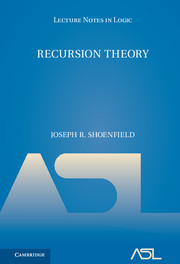Book contents
- Frontmatter
- Introduction
- Contents
- 1 Computability
- 2 Functions and Relations
- 3 The Basic Machine
- 4 Macros
- 5 Closure Properties
- 6 Definitions of Recursive Functions
- 7 Codes
- 8 Indices
- 9 Church's Thesis
- 10 Word Problems
- 11 Undecidable Theories
- 12 Relative Recursion
- 13 The Arithmetical Hierarchy
- 14 Recursively Enumerable Relations
- 15 Degrees
- 16 Evaluation of Degrees
- 17 Large RE Sets
- 18 Functions of Reals
- 19 The Analytical Hierarchy
- 20 The Projective Hierarchy
- Suggestions for Further Reading
- Index
Introduction
Published online by Cambridge University Press: 24 March 2017
- Frontmatter
- Introduction
- Contents
- 1 Computability
- 2 Functions and Relations
- 3 The Basic Machine
- 4 Macros
- 5 Closure Properties
- 6 Definitions of Recursive Functions
- 7 Codes
- 8 Indices
- 9 Church's Thesis
- 10 Word Problems
- 11 Undecidable Theories
- 12 Relative Recursion
- 13 The Arithmetical Hierarchy
- 14 Recursively Enumerable Relations
- 15 Degrees
- 16 Evaluation of Degrees
- 17 Large RE Sets
- 18 Functions of Reals
- 19 The Analytical Hierarchy
- 20 The Projective Hierarchy
- Suggestions for Further Reading
- Index
Summary
These notes originated in a one semester course given several times at Duke University. Students were generally graduate students in mathematics or computer science. They were expected to have a considerable degree of mathematical maturity. While there were no specific prerequisites, it was desirable that the student has some knowledge of elementary logic and computer programming. To appreciate some of the applications, it was desirable to have at least a slight acquaintance with some other mathematical topics, such as group theory and Borel sets.
My main object was to prepare the student for studying advanced books and journal articles in recursion theory. I therefore attempted to introduce as many as possible of the topics which are of interest in contemporary research without going deeply into any of them. One topic usually treated in the course which did not make its way into these notes is complexity theory; I hope that someone more competent than I will write an introduction to this topic suitable for serious mathematicians.
Information
- Type
- Chapter
- Information
- Recursion Theory , pp. v - viPublisher: Cambridge University PressPrint publication year: 2017
